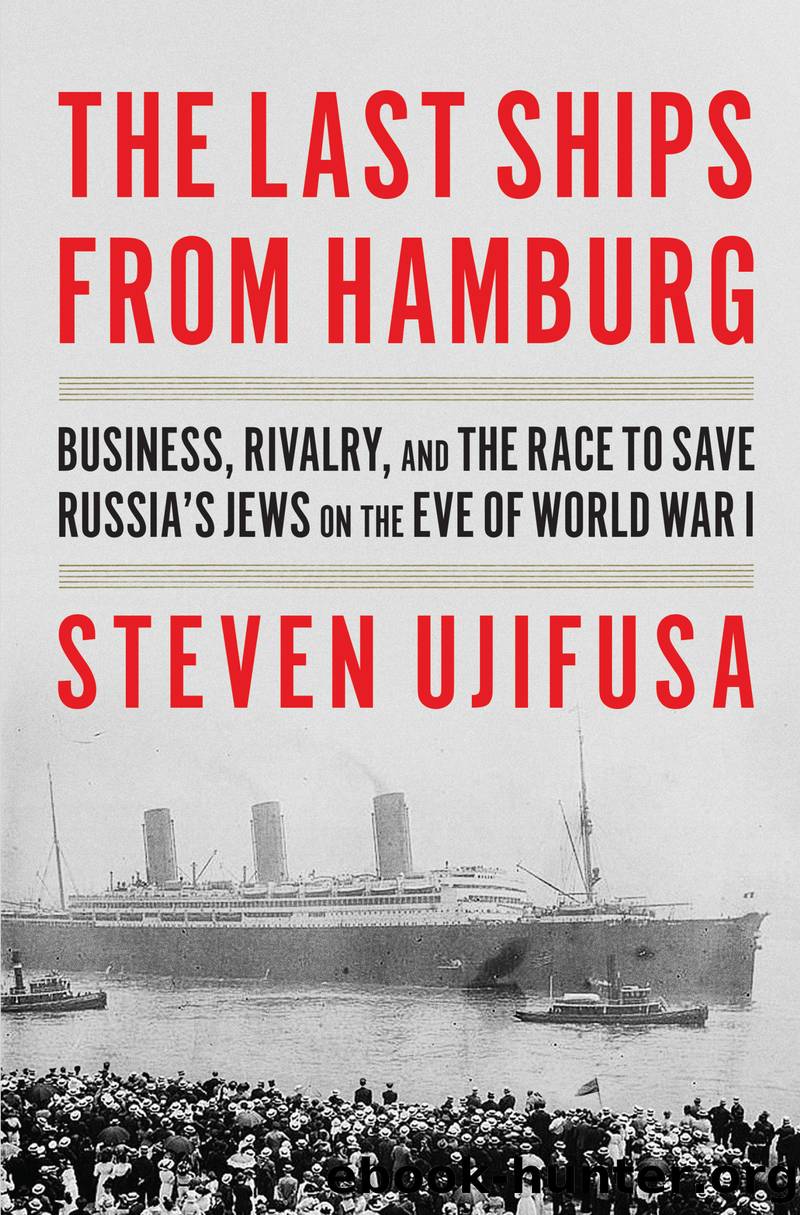Last Ships from Hamburg The by Steven Ujifusa

Author:Steven Ujifusa
Language: eng
Format: epub
Publisher: HarperCollins
Published: 2023-09-26T00:00:00+00:00
Chapter 15
Revolution and Rebuilding
In politics as well as in business he held that âa lean compromise was preferable to a fat lawsuit,â as the German proverb puts it.
âBERNHARD HULDERMANN ON ALBERT BALLIN
The Russo-Japanese War was a disaster for Russia, but a bonanza for Albert Ballin and HAPAG. To avoid conscription into Nicholas IIâs army, hundreds of thousands of Russian subjects tried to get out of the czarâs empire. Many who were sure to become conscripts sold everything to pay for a passage to the New World. Others already conscripted deserted their units. By train and by foot, all amassed at the Prussian border in ever greater numbers.
To stop the fighting and prevent the Japanese from dealing too great a blow to the Russian Empire, President Roosevelt called for a peace conference between the two warring nations at Portsmouth, New Hampshire. Rooseveltâs policy goal was to curb, while also appeasing, Japanâs expansionist impulses and to stabilize Russia. The resulting Treaty of Portsmouth, ratified by both nations in October 1905, recognized Japanâs territorial claims on the Korean Peninsula and ceded Port Arthur to the rising Asian power. In return, the Russians avoided having to pay costly war reparations to Japan, since the defeated countryâs finances were on the brink of collapse.
The war was also good for Kuhn, Loeb & Co. in New York and M. M. Warburg & Co. in Hamburg. As a matter of principle, Jacob Schiff refused to underwrite any bond offerings to support the Russian government. But he did support the Japanese government. When Baron Korekiyo Takahashi, a high-ranking Japanese bureaucrat and financier, floated a proposal for a 10-million-pound bond issue to be offered to American and British investors to finance its war with Russia, Jacob Schiff enthusiastically volunteered to underwrite half the deal. So successful was the American offering that Kuhn, Loeb underwrote a second one. When Japan asked for a third loan, Schiff threw the deal to M. M. Warburg & Co., and it was ten times oversubscribed. All the more insulting to Czar Nicholas II was that his cousin Kaiser Wilhelm II, who had raged against the âyellow peril,â gave the deal his royal blessing.
Jacob Schiff saw the war in religious terms, calling Russia âthe Northern Goliathâ and Japan âthe Far Eastern David.â As a Jew, Schiff felt underwriting the underdog was simply doing his part to âsave the entire civilized world,â just as he tithed 10 percent of his vast income to charity to uplift the civilized world.
The war, and the failed Revolution of 1905, had not changed âthe Northern Goliathâ in any meaningful way, especially for its Jews. Czar Nicholas IIâs autocratic regime grew increasingly isolated and out of touch. As part of a modest package of concessions to stave off further unrest, the czar had allowed the creation of a representative body known as the Duma, a watered-down version of Germanyâs Reichstag. It was largely the brainchild of Nicholas IIâs prime minister Serge Witte, the lead negotiator in the Portsmouth Conference and someone
Download
This site does not store any files on its server. We only index and link to content provided by other sites. Please contact the content providers to delete copyright contents if any and email us, we'll remove relevant links or contents immediately.
| Americas | African Americans |
| Civil War | Colonial Period |
| Immigrants | Revolution & Founding |
| State & Local |
In Cold Blood by Truman Capote(3365)
The Innovators: How a Group of Hackers, Geniuses, and Geeks Created the Digital Revolution by Walter Isaacson(3107)
Steve Jobs by Walter Isaacson(2876)
All the President's Men by Carl Bernstein & Bob Woodward(2357)
Lonely Planet New York City by Lonely Planet(2204)
And the Band Played On by Randy Shilts(2179)
The Room Where It Happened by John Bolton;(2140)
The Poisoner's Handbook by Deborah Blum(2123)
The Innovators by Walter Isaacson(2088)
The Murder of Marilyn Monroe by Jay Margolis(2085)
Lincoln by David Herbert Donald(1976)
A Colony in a Nation by Chris Hayes(1912)
Being George Washington by Beck Glenn(1870)
Under the Banner of Heaven: A Story of Violent Faith by Jon Krakauer(1779)
Amelia Earhart by Doris L. Rich(1680)
The Unsettlers by Mark Sundeen(1673)
Dirt by Bill Buford(1660)
Birdmen by Lawrence Goldstone(1650)
Zeitoun by Dave Eggers(1630)
